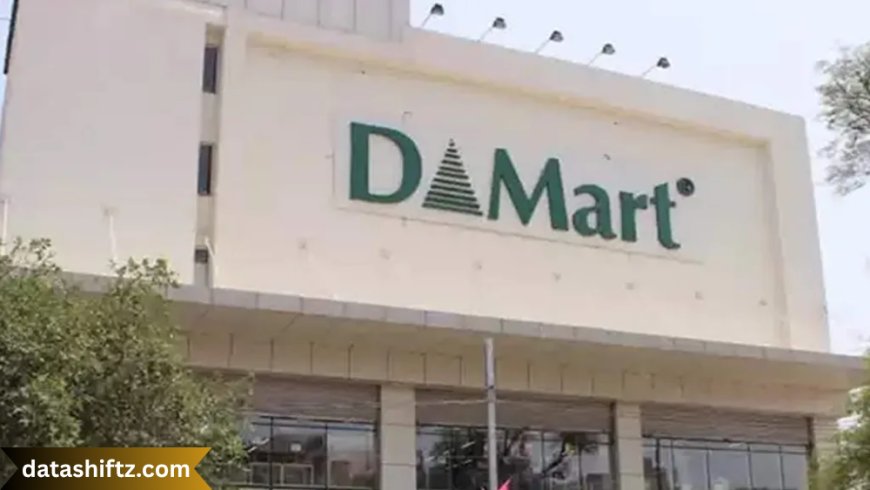DMart Share Price: Trends, Strengths & Investor Outlook

Introduction
Avenue Supermarts Limited, better known by its brand name DMart, has emerged as a formidable player in Indian organized retail. Founded by Radhakishan Damani with the first store in Mumbai in 2002, DMart has consistently followed an “Everyday Low Cost – Everyday Low Price” retail philosophy. This strategy, combined with stringent cost controls and slow-but-steady expansion, has driven impressive growth. Understanding its share price trajectory, the drivers behind its valuation, and key financial metrics is essential for investors evaluating entry or exit opportunities. This blog post provides a detailed analysis of DMart’s recent share price performance, fundamentals, market sentiment, and future outlook.
DMart Share Price Overview
Current Share Price Status
According to the latest market data, DMart shares are trading around ₹4,200 – ₹4,300 per share on both NSE and BSE exchanges
-
NSE/BSE price range: ₹4,000 – ₹4,300
-
52‑week low: ₹3,340; 52‑week high: ₹5,485
Share Price Movement Table
| Metric / Time Frame | Approx. Share Price (₹) | Change / Range |
|---|---|---|
| Previous Close | ₹3,999 – ₹4,000 | — |
| Current Price (as of July 30, 2025) | ₹4,212 – ₹4,300 | +5 % to +7 % day gain |
| 52‑Week Range | ₹3,340 – ₹5,485 | Significant volatility |
| Year‑to‑Date (YTD) Movement | Up slightly year‑on‑year | Moderate recovery |
Fundamental & Financial Analysis
Financial Performance Overview
DMart's recent quarterly and annual financials show solid retail execution but mounting pressure on margins.
Q1 FY26 Summary:
-
Net Profit: ₹830 crore, YoY growth of ~2% (₹812 cr in Q1 FY25)
-
EBITDA Margin: Declined from ~8.9% to ~8.2% due to cost and deflationary pressures in staples/events
Annual Trends (FY21–FY25):
From company filings:
-
Revenue: Grew steadily from ₹24,143 cr in FY21 to ₹59,358 cr in FY25
-
Net Profit: ₹1,099 cr → ₹2,707 cr over same period
-
EPS: ₹16.97 → ₹41.61; BVPS: ₹188 → ₹329; ROE peaked at ~14.8% then eased to ~12.6%
Balance-sheet Strength:
-
Nearly debt free with Debt‑to‑Equity below 5%; net debt coverage by operating cash flow is strong (~300%) and interest coverage ~44x
Fundamental Metrics Table
| Metric | FY 2025 |
|---|---|
| Revenue | ₹59,358 crore |
| Net Profit | ₹2,707 crore |
| EPS | ₹41.61 |
| Book Value per Share | ₹329.29 |
| ROE | ~12.6 % |
| Debt‑to‑Equity | ~0.04 (virtually zero) |
| P/E (TTM) | ~100–103× |
| P/B | ~12×–14× |
| Dividend Yield | 0 % |
Key Drivers & Market Sentiment
List of Growth Drivers
-
✅ Strong value-retail positioning with a focus on efficiency and low-cost sourcing.
-
✅ Store expansion; recently added 11 new stores in June quarter, taking total to ~426 stores as of July 2025 .
-
✅ Growing online grocery segment (DMart Ready), with 21% YoY growth in FY25 to ₹3,502 crore, though losses widened due to aggressive expansion.
-
✅ Debt-free balance sheet supports expansion with internal accruals.
List of Near-term Risks or Constraints
-
⚠️ Modest profit growth: Q1 shows only 2% net income increase despite 16% revenue uptick.
-
⚠️ Margin pressure due to intense competition & deflation in staples market.
-
⚠️ Valuation concerns: trading at high P/E (~100×) and P/B (~12×–14×), well above sector averages (~90× P/E) .
-
⚠️ Broker downgrades: Macquarie gave “Underperform” with ₹3,000 target; HSBC cut target to ₹3,500 citing moderation in growth.
SWOT Analysis of DMart Share Price
| Strengths | Weaknesses |
|---|---|
| Established retail network (~426 stores) | High valuation multiples (PE & PB) |
| Debt-free, strong cash flow generation | Margin compression in competitive FMCG space |
| Disciplined cost controls and value model | Slower profit growth despite revenue uptick |
| Long-term earnings growth track record | No dividends, reinvests into capex and expansion |
| Opportunities | Threats |
|---|---|
| Online grocery & e‑commerce scale-up | Quick commerce competition (e.g., BigBasket, Blinkit) |
| Expansion into under-served markets/states | Macro slowdown, inflation, rural consumption risks |
| New merchandise categories & private labels | Regulatory changes impacting retail policies |
| Further economies of scale as store count rises | Stock correction if growth stalls |
Technical & Sentiment outlook
Share Price Dynamics & Analyst Opinions
-
DMart shares recently rallied by about 6% following strong remarks on value-retailing expansion and downplaying quick‑commerce threats.
-
Brokerages reacted to muted Q1 revenue/margin performance with cautious stances: Nuvama, MOSL, Macquarie, HSBC offering hold/down ratings and lowered targets between ₹3,000–₹3,500, below current price. Depending on earnings improvement in coming quarters, sentiment may swing either way.
Support / Resistance & Target Levels (Indicative)
-
Support zone: ₹4,000–₹4,100 (recent lows and VWAP zone).
-
Resistance zone: ₹4,300–₹4,500 (near recent high).
Analysts’ 12‑month average target ~₹4,054, implying slight downside from current levels.
Investment Outlook: Who Should Consider DMart Shares?
List of Investor Profiles
-
Long‑term value investors seeking exposure to India’s consumer retail growth and proven retail model with minimal leverage.
-
Growth-oriented investors betting on expansion of store footprint and online growth to improve margins.
-
Cautious traders might prefer a wait‑and‑watch approach due to current high valuation and margin pressure.
List of Key Considerations Before Investing
-
???? Track quarterly margin trends closely to assess recovery or continued pressure.
-
???? Monitor store additions and same‑store growth performance.
-
???? Watch profit growth relative to revenue growth to gauge operational leverage.
-
???? Watch analyst target revisions and broker ratings as they reflect sentiment.
-
???? Consider sector outlook for FMCG/retail and consumer spending trends.
Conclusion
DMart’s share price reflects its strong business execution, disciplined expansion and debt‑free financial health. However, recent Q1 FY26 results showed limited net profit growth despite healthy topline increase, with margins under strain. Current valuations are lofty, and some brokerages have moderated their outlook.
That said, for long-term investors believing in India’s multi-decade value‑retail opportunity, DMart continues to offer a story backed by solid fundamentals and disciplined management. A balanced risk‑aware strategy—buying on dips, watching operating metrics, and avoiding overpaying at peak valuations—could help capture value here.






























